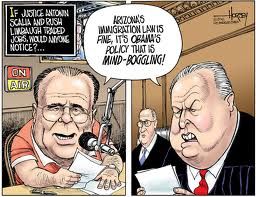The latest efforts by state authorities to protect the police who abuse their authority has been dealt a blow by the US Supreme Court. From the Chicago Tribune:
The Supreme Court refused on Monday to revive a controversial Illinois law that prohibited audio recordings of police officers acting in public places, a ban that critics said violated the First Amendment of the U.S. Constitution.
Without comment, the court on Monday let stand a May 8 ruling by the 7th U.S. Circuit Court of Appeals in Chicago that blocked enforcement of the law, which had made it a felony to record audio of conversations unless all parties consented.
In a 2-1 ruling, the 7th Circuit called the law “the broadest of its kind,” and said it likely violated the free speech and free press guarantees in the First Amendment.
MSNBC “The Last Word“ host, Lawrence O’Donnell, commented on the importance of this ruling during his “Rewrite” segment:
“After the Rodney King beating, Chicago police decided to use an old anti-eavesdropping law to protect themselves-a law which basically made it a felony to record a conversation unless all parties agree to be recorded,” said O’Donnell, giving part of the back-story. “That, in effect, meant you couldn’t shoot video of Chicago police because, of course, video recording normally includes sound.” [..]
“The good police officers in this country, which is to say most of the police officers in this country, have no problem with the Supreme Court’s decision this week,” said O’Donnell. “Thanks to federal judges appointed by both Democratic and Republican presidents, some Chicago cops-the bad ones-have something new to fear, tonight: your video camera.”
George Washington University law professor Jonathan Turley also commented about the Court’s decision and had some very harsh criticism of Cook County State’s Attorney Anita Alvarez:
As a native Chicagoan, I remain astonished that citizens have allowed Alvarez to remain in office as she has publicly sought to strip them of their rights and block a tool that has been used repeatedly to show police abuse. For a leading and generally liberal jurisdiction, Chicago has the ignominy and dishonor of leading the effort to fight core civil liberties in this area. [..]
It is otherworldly to see these abuses occurring in two usually progressive jurisdictions of California and Illinois. Alvarez has become the leader of this rogue’s gallery of prosecutors who have strived to jail their own citizens for monitoring police in public. It is, to put it bluntly, a disgrace. While Alvarez failed in her latest bid, she and other prosecutors remain undeterred in their desire to see citizens punished for such videotapes – tapes that have featured prominently in establishing false arrests and police abuse. Before such filming, abuse claims were overwhelmingly rejected with the denials of the officers. Now, there is often undeniable proof – proof that Alvarez and others want barred under the threat of criminal prosecution.
Prof. Turley also points out that the trend to protect bad police is not over:
We have been discussing the continued effort of prosecutors and police to jail citizens who photograph or videotape police in public. For a prior column, click here. Now, in California, another such arrest has been videotaped in California as Daniel J. Saulmon was charged with resisting, delaying and obstructing an officer when the video shows him standing at a distance and not interfering in any way with the arrest.
The officer immediately demanded to know what Saulmon is doing when it is obvious, as Saulmon indicates, that he is filming the scene. Saulmon states that he does not want to speak to the officer when asked for his identification and the officer immediately puts him under arrest. Ironically, the officer then tells him that he doesn’t need any identification since that will be handled at the booking. [..]
Saulmon reportedly spent days in jail. Such jailings serve as a deterrent for abusive police officers since few citizens want to face such incarceration as well as the cost of defending against criminal charges. Even when later thrown out (which often happen to such charges), the message is sent and the officers are rarely disciplined. I have little doubt that this case will be thrown out. The question is whether people in California will demand action to discipline the officer, who swore to charges that are clearly invalid and abusive.
And these cases from Maryland and Massachusetts
In Maryland in July, Anthony Graber got a well-deserved speeding ticket, but his real mistake was posting footage from his motorcycle helmet-cam on YouTube. It showed an irate off-duty, out-of-uniform officer pulling him over with his gun drawn. Prosecutors obtained a grand jury indictment against Graber on felony wiretap charges, which carry a 16-year prison sentence.
In Boston in August, the U.S. 1st Circuit Court of Appeals ruled unambiguously that the Constitution protects citizen videographers filming in public. In that case, attorney Simon Glik was walking past the Boston Common on Oct. 1, 2007, when he came upon three Boston officers arresting a man. Glik turned on his cellphone camera after hearing a witness say the police were being abusive. An officer told Glik to turn off his camera. When Glik refused, he was arrested for violation of the state wiretap statute, disturbing the peace and, for good measure, aiding in the escape of a prisoner.
The charges were dismissed after a public outcry, but in a later civil rights case, city attorneys fought to deny citizens the right to videotape police. The court rejected Boston’s arguments and found that the police had denied Glik his 1st and 4th Amendment rights.
Score one for the 1st and 4th Amendments.


 In his dissenting opinion on the
In his dissenting opinion on the
Recent Comments